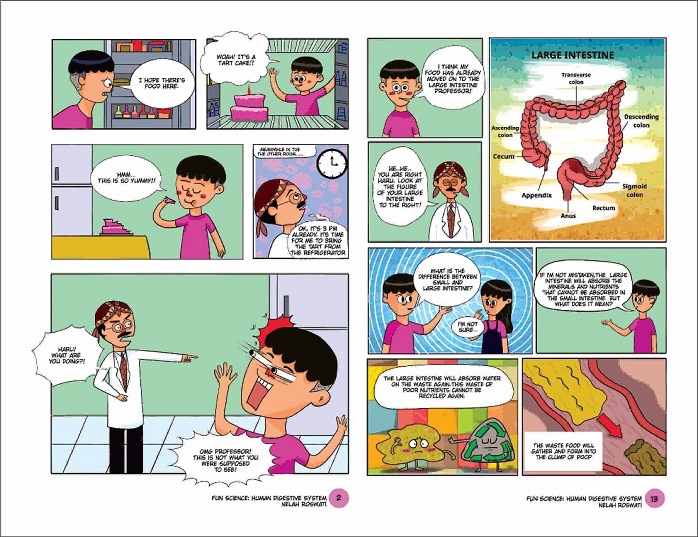
The Development of Science Comic in Human Digestive System Topic for Junior High School Students
Abstract
The science education approach has covered by using printed teaching media. One of the popular printed press that most accessible and may used in science education is a comic book. However, it is sometimes difficult to find the ideal and the appropriate comic books that can be used as the instructional tool of science education, because most of them are inappropriate for learning science and did not fit with the readers’ culture. The purpose of this study is to develop and evaluate the Science comic to contribute to science learning about Human Digestive System Topic (HDST) concepts. In this study, a science comic book was created and implemented to 92 students of year eight from three different junior high schools and three science teachers as a subject implementation development. Students’ responses through the questionnaire and students-teachers’ implementation test sheets evaluated through qualitative content analysis. The model used for this study is design and development. The result shows, most of the students agreed that science comic book helps them to learn through simplifying science concept and understanding the topic more accessible. The ideal science comic should also follow the right steps, appropriate aspects consisted, gain more science experience for both students and teachers to enjoy the learning process.
Highlights
- Science comic is one of effective printed teaching media
- Humour can be illustrated by the narrative to transfer the information of science
- Science comic can cover the need to communicate the fascination, joy, and utility of science
Full Text:
DOWNLOAD PDFReferences
Ahi, B. (2017). Thinking about digestive system in early childhood: A comparative study about biological knowledge. Cogent Education, 4(1), 1278650.
Dalacosta, K., Kamariotaki-Paparrigopoulou, M., Palyvos, J. A., & Spyrellis, N. (2009). Multimedia application with animated cartoons for teaching science
In elementary education. Computers & Education, 52(4), 741-748.
Detjen, J. (1995). The media's role in science education. BioScience, 45, S58-S63.
Falk, J. H., Storksdieck, M., & Dierking, L. D. (2007). Investigating public science interest and understanding: Evidence for the importance of free-choice learning. Public Understanding of Science, 16(4), 455-469.
Geerdts, M. S., Van de Walle, G. A., & LoBue, V. (2015). Daily animal exposure and children’s biological concepts. Journal of experimental child psychology, 130, 132-146.
Gilbert, J. K., & Lin, H. S. (2013). How might adults learn about new science and technology? The case of nanoscience and nanotechnology. International Journal of Science Education, Part B, 3(3), 267-292.
Hosler, J., & Boomer, K. B. (2011). Are comic books an effective way to engage nonmajors in learning and appreciating science?. CBE—Life Sciences Education, 10(3), 309-317.
Istikomayanti, Y., & Mitasari, Z. (2017). Student’s misconception of digestive system materials in MTs eight grade of Malang city and the role of teacher’s pedagogic competency in MTs. Jurnal Pendidikan Biologi Indonesia, 3(2), 103-113.
Lin, S. F., Lin, H. S., Lee, L., & Yore, L. D. (2015). Are science comics a good medium for science communication? The case for public learning of nanotechnology. International Journal of Science Education, Part B, 5(3), 276-294.
Ozdemir, E. (2017). Humour in elementary science: Development and evaluation of comic strips about sound. International Electronic Journal of Elementary Education, 9(4), 837-850.
Tatalovic, M. (2009). Science comics as tools for science education and communication: a brief, exploratory study. Journal of Science Communication, 8(4), A02.
DOI: https://doi.org/10.17509/jsl.v3i1.18120
Refbacks
- There are currently no refbacks.
Copyright (c) 2019 Nelah Roswati

This work is licensed under a Creative Commons Attribution-ShareAlike 4.0 International License.


Jl. Dr. Setiabudhi 229 Bandung 40154, West Java, Indonesia











